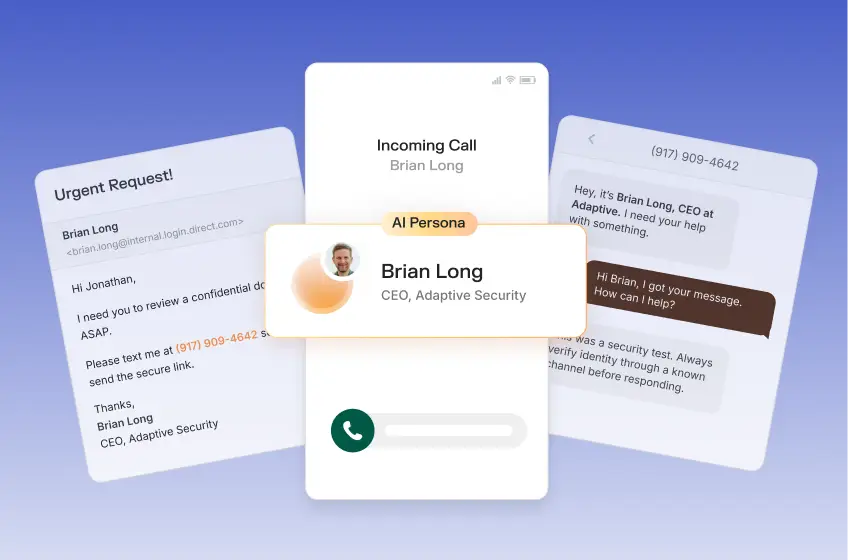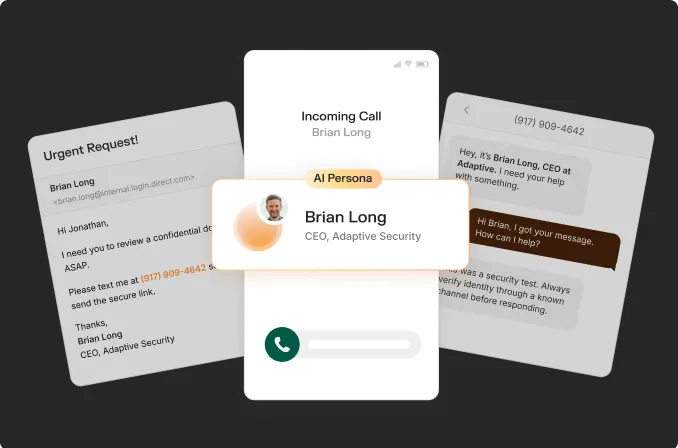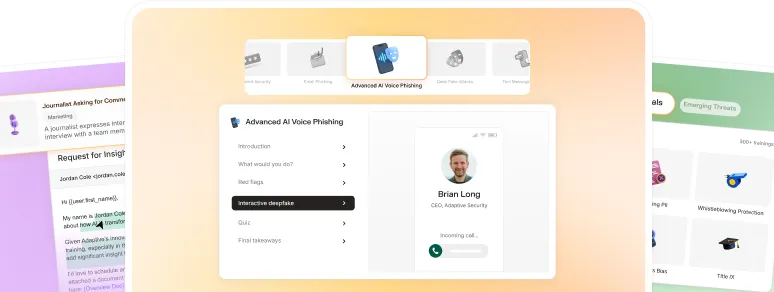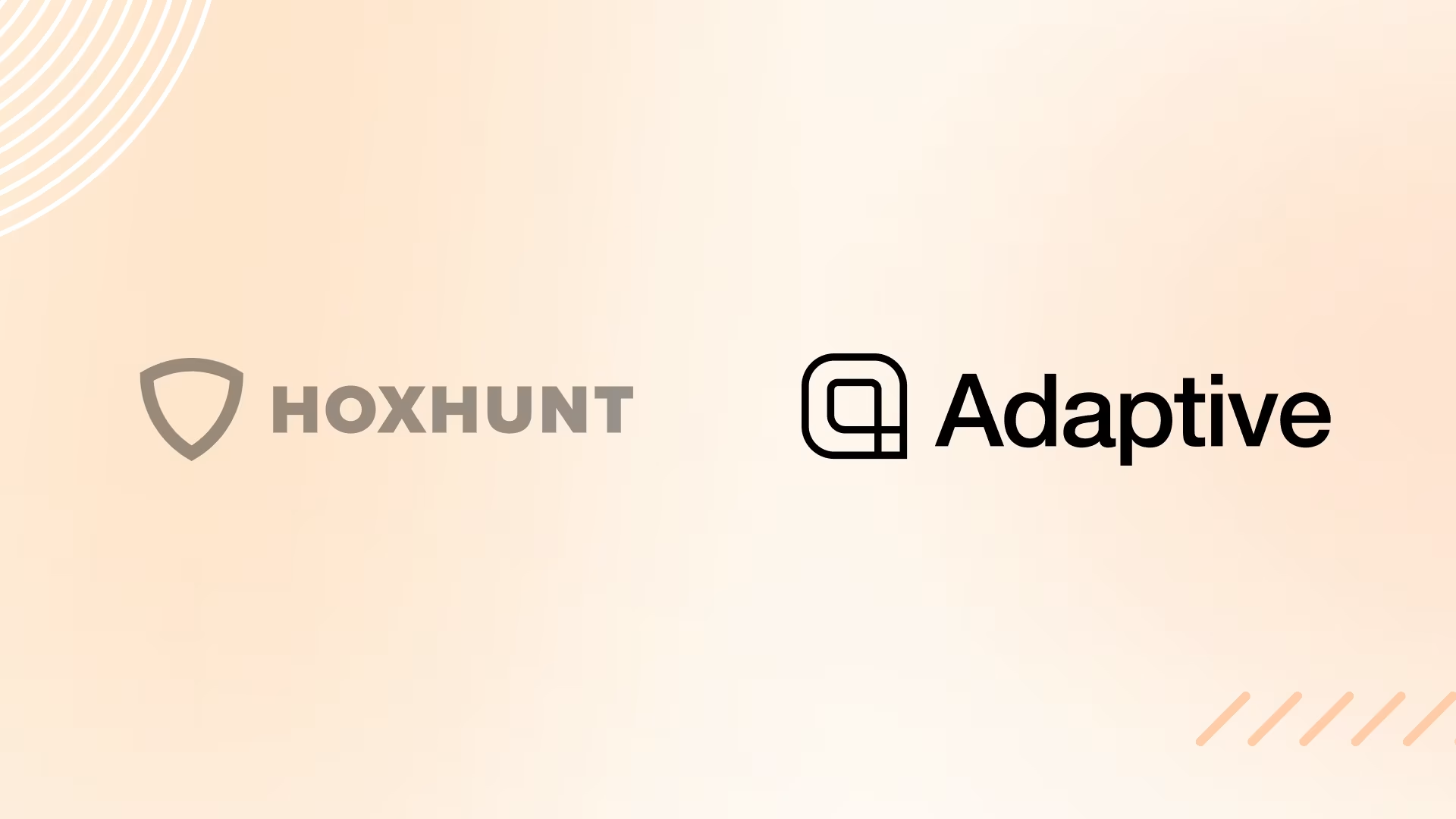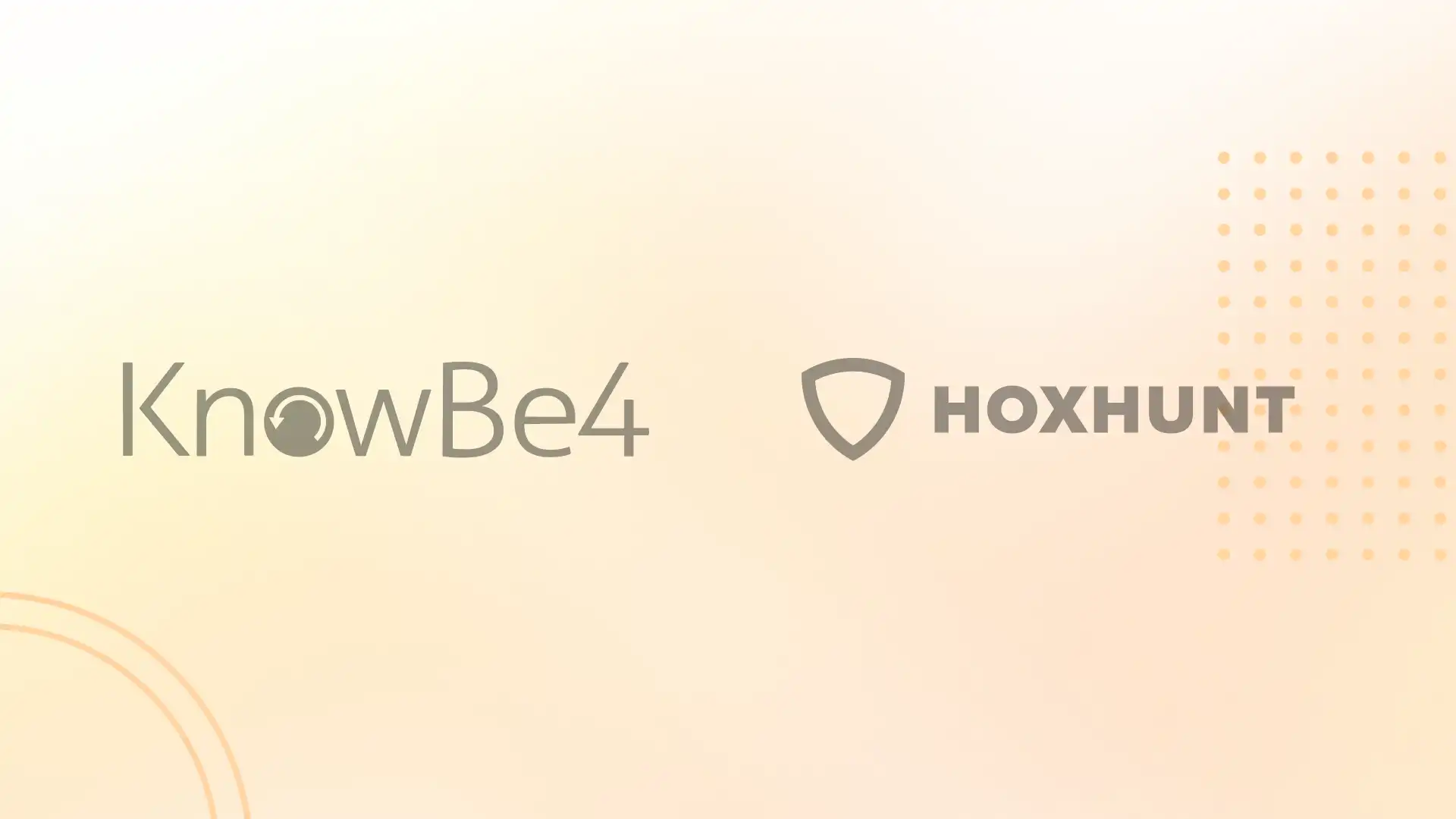The right phishing simulation tool can mean the difference between stopping an attack and falling victim. For many teams, Hoxhunt’s drawbacks—price, contract structure, and lack of deepfake readiness—make it less than ideal. This article reviews the top alternatives and gives a clear framework for choosing the platform that actually fits your needs.
- Adaptive Security
- KnowBe4
- Proofpoint
- Cofense
- Keepnet Labs
- Guardey
- SoSafe
- Infosec IQ
Why consider alternatives to Hoxhunt?
Hoxhunt made waves by gamifying security awareness training, but IT and security leaders are starting to look elsewhere. Phishing training today requires more than points, badges, or generic templates. It must address evolving threats, including AI-driven attacks. Here are the most common factors driving them to explore alternatives.
Limited innovation in AI/deepfake defenses
Attackers are no longer using generic “reset your password” emails. They can clone your CEO’s voice and call the finance team asking for an urgent wire transfer, or spin up a fake Zoom interview with a “candidate” who looks and sounds real.
This isn’t just a passing fad. A recent Gartner report noted that 30% of social engineering attacks will use AI-generated content by 2026. This raises a question for security leaders: are current training platforms preparing employees for these new attacks, or are they still trying to solve yesterday’s problems?
Hoxhunt’s approach comprises gamification and static phishing templates. And while the platform’s AI capabilities work well with email, its training coverage for emerging threats like deepfake calls, synthetic video impersonations, and multi-channel AI lures is still largely absent.
In contrast, some newer platforms are building AI-driven security awareness training and deepfake simulations that replicate deepfake calls or SMS smishing attempts. This enables employees to address new-age attacks, rather than being stuck with outdated training.
Scalability issues
Hoxhunt works well in organizations with smaller to mid-sized deployments. However, large enterprises may find the platform more challenging to scale globally due to limited customization and localization, and rolling out consistent, region-specific training in multiple languages could become a challenge.
Phishing training doesn’t work if it can’t scale. Today’s security programs need flexible localization, role-specific learning paths, and real-time analytics across every inbox and collaboration tool. For hybrid and global teams, that means choosing a platform proven at enterprise scale.
Support and integration gaps
While online reviews praise Hoxhunt’s support team, some enterprise reviewers note scalability challenges. Integrations with complex security stacks such as Security Information and Event Management (SIEM) or Identity and Access Management (IAM) often require custom development instead of turnkey connectors. This creates more overhead than expected for global IT teams managing dozens of tools.
Adaptive Security comes with a library of plug-and-play integrations into tools like Slack, Microsoft Teams, Okta, Splunk, and ServiceNow, eliminating manual exports or custom scripts. This allows training data (employee risk scores, phishing test results, completions) to flow directly into existing dashboards without manual exports or custom scripts, cutting admin workload and giving leadership faster visibility.
Cost and contract challenges
Pricing and contract terms are a recurring concern in peer discussions about Hoxhunt. Customers on Reddit describe sharp price differences between its service tiers and note that multi-year contracts are often part of the negotiation.
One security leader even suggested using three-year pricing with exit clauses as leverage during contracting, a sign that flexibility isn’t always standard.
These dynamics can make budgeting unpredictable for security teams under pressure to prove ROI. The lesson: don’t just compare headline prices. Ask vendors how their pricing scales with headcount changes and whether exit terms are built in.
Top Hoxhunt alternatives in 2025 (comparison table)
Competitor analysis
Organizations have many platforms to choose from, so how do you know which to choose? We’ve compiled a list of the top Hoxhunt competitors to help IT and security teams find the best security awareness training platform.
1. Adaptive Security

Adaptive Security is a next-gen security awareness training platform built for the new wave of AI-driven threats like deepfakes, voice cloning, and SMS phishing—not just old-school phishing emails.
Backed by OpenAI’s Startup Fund, the platform uses AI to generate tailored training and simulations so employees can practice against realistic attacks. Companies like Figma, the Dallas Mavericks, and First State Bank already use it to prepare staff for high-fidelity scams.
Adaptive stands out for its ability to create tailored training modules for roles like finance, HR, or executive staff in hours. For example, a finance team might get a deepfake invoice scam, HR might see a fake candidate interview video, and an executive assistant might face a voice-cloned CEO call.
Adaptive’s AI content creation builder crafts these scenarios automatically from real-world attack patterns, so training feels immediately relevant.

For CISOs, the payoff is simple: less manual effort, more relevant training, and employees who are ready for the kinds of AI-powered attacks hitting inboxes, phones, and even Zoom calls today.
Pros of Adaptive Security:
- AI-generated, tailored training content for any industry or role
- Deepfake and voice phishing simulations featuring OSINT-based personas
- Competitive pricing with an all-in-one platform for training, simulations, and analytics
- Modern, intuitive user interface with rapid feature innovation
- Dedicated customer success managers for every organization
- Adaptive, role-based simulations such as executive deepfakes or department-tailored scenarios
- Integration with standard workplace tools (Slack, Teams, Okta, Splunk, ServiceNow)
Cons of Adaptive Security:
- Automated threat remediation features are still in beta.
- Rapid product updates require administrators to stay engaged.
Adaptive Security is a good fit for organizations that want cybersecurity training that goes beyond basic email phishing attacks. Instead of just teaching employees how to spot spam in their inbox, it prepares them for modern threats like voice phishing calls, text-message scams, and AI-generated deepfakes, helping teams stay ahead of the attacks they’re most likely to face today.
2. KnowBe4
A long-standing leader in security awareness training, KnowBe4 offers a massive library of content, comprehensive phishing simulations, and integrations with popular security tools.
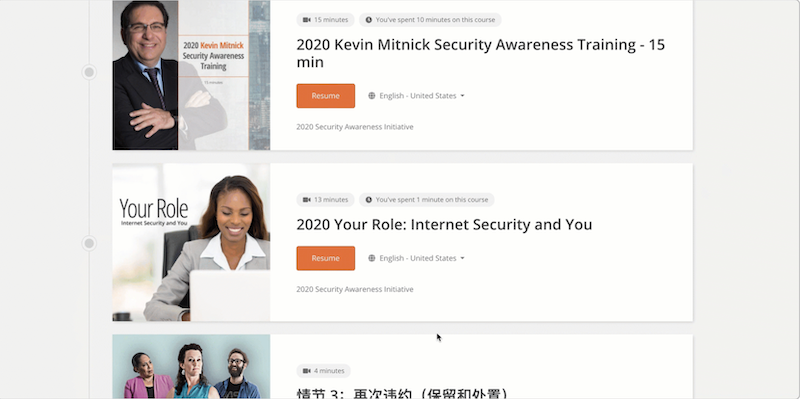
That said, KnowBe4’s content is more traditional than forward-looking. While the platform addresses AI threats through content and blogs, it doesn’t yet offer simulations in the training modules. Its dated UI and complex admin setup can also feel heavy for modern teams looking for agility.
Pros of KnowBe4:
- Extensive training materials covering multiple security topics
- Mature phishing simulation platform with robust analytics
- Strong community and customer support
- Compliance-focused training tracks
Cons of KnowBe4:
- Its outdated content has little focus on AI threats.
- The UI and UX are dated and not built for modern organizations.
- Pricing tends to be higher, especially with add-ons, which can be limiting for smaller organizations.
- Some users find content less personalized or repetitive.
- The admin interface can be complex for new users.
While KnowBe4 may work for enterprises needing a comprehensive training and simulation platform, it’s not focused on the next generation of AI threats. For new-age AI threats, you’ll have to look for KnowBe4 alternatives that offer simulations for deepfakes, voice phishing (vishing), SMS phishing (smishing), and other AI-driven vulnerabilities.
3. Proofpoint
Proofpoint integrates phishing simulations with email security to provide a cohesive approach to threat detection and training. If a new phishing campaign gets detected in the wild, it can quickly push a look-alike version to employees as a test. This lets staff practice against the same threats attackers are actually using, instead of generic templates.

Pros of Proofpoint:
- Realistic phishing campaigns updated to reflect current threats
- Tight integration with Proofpoint’s email security products
- Interactive content with quizzes and assessments
Cons of Proofpoint:
- Complex setup and configuration require dedicated resources.
- Training content may feel generic without customization.
Overall, Proofpoint works well for organizations already invested in Proofpoint’s security ecosystem seeking unified defense.
4. Cofense
Cofense focuses heavily on phishing defense and employee reporting, training staff to spot phishing and providing a simple “PhishMe Reporter button” for reporting suspicious emails directly to the security team for review.
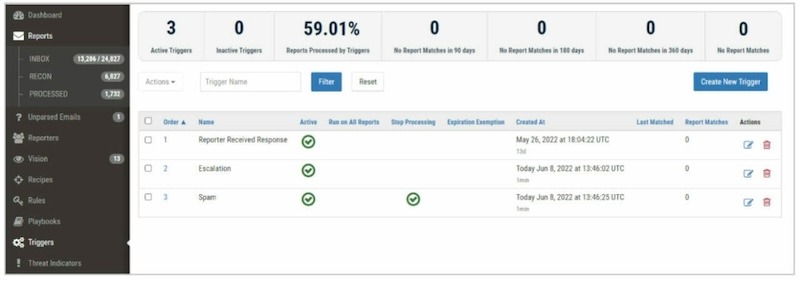
Reported messages flow into Cofense Triage, where security teams can analyze them and, if needed, quarantine them across the organization. That feedback loop means training and detection work together, allowing employees to actively feed threat intel back to the SOC while learning.
Pros of Cofense:
- Strong phishing reporting workflow (PhishMe Reporter + Triage)
- Real-world simulations that mimic active phishing campaigns
- Quarantine and response features go beyond awareness training
- Good fit for security teams that want end-user reporting data in their SOC
Cons of Cofense:
- It’s limited by its narrow focus on phishing.
- The setup and tuning of Triage/Orchestrator require security expertise.
- Pricing skews higher when adding response modules.
- UI feels more built for analysts than for general admin ease.
All in all, Cofence is a good choice for organizations that want employees actively feeding threat intel to the SOC. Its reporting button ties directly into Cofense Triage, allowing suspicious emails to get analyzed and quarantined across the company in near real time.
5. Keepnet Labs
Keepnet Labs is a security awareness platform that centers on phishing training and automated response. Companies can send realistic phishing emails to test employees, and anyone who clicks is automatically enrolled in follow-up training.
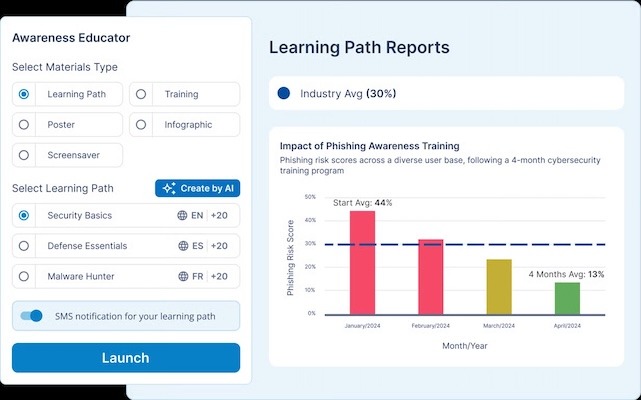
When an employee reports a suspicious email, Keepnet helps the security team quickly analyze it and remove similar malicious emails across the organization, cutting down manual cleanup.
Pros of Keepnet Labs:
- Phishing simulations with automatic user-specific follow-up training
- Email Threat Simulator to test security controls, not just people
- Threat Sharing community to stay ahead of active phishing campaigns
- Scalable for MSSPs and organizations managing multiple tenants
Cons of Keepnet Labs:
- Less focus on broader security topics (compliance, general awareness)
- Interface can feel cluttered compared to newer vendors
- Strongest features (like Incident Response automation) require higher-tier plans
- Market presence is smaller than vendors like Proofpoint or KnowBe4
Keepnet Labs is suited for teams that want phishing tests tightly linked with automated cleanup.
6. Guardey
Guardey positions itself as a gamified cybersecurity awareness platform designed for SMEs and distributed teams. Instead of long annual training, employees get short weekly challenges delivered inside a game-like environment.
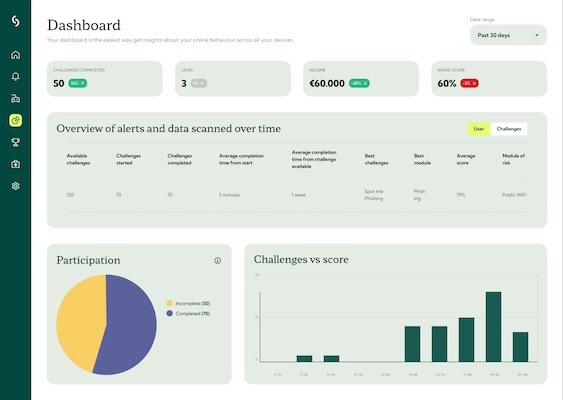
The idea is to build consistent security habits over time, rather than overwhelming staff with heavy modules. Guardey also adds a lightweight VPN and monitoring layer for remote workers to bundle awareness and basic protection together.
Pros of Guardey:
- Weekly bite-sized training in a gamified format keeps employees engaged
- Strong fit for SMBs that lack a dedicated security training team
- Combines awareness training with a built-in VPN for safer remote work
- Simple setup with minimal admin overhead
Cons of Guardey:
- Content depth is limited compared to enterprise vendors.
- It’s less suited for highly regulated industries needing compliance-heavy training.
- The platform’s gamified style may feel too casual for larger corporate environments.
- Reporting and customization options are more basic than those of competitors.
Guardey is tailored for SMBs and remote teams that need lightweight, engaging training. Employees complete weekly game-style challenges, while the platform’s built-in VPN adds a layer of protection for distributed workforces.
7. SoSafe
SoSafe positions itself as a human risk management and security awareness platform, popular among European enterprises and mid-sized companies. It blends personalized phishing simulations, micro-learning modules, and behavioral analytics to reduce risk by training employees in real-world scenarios.
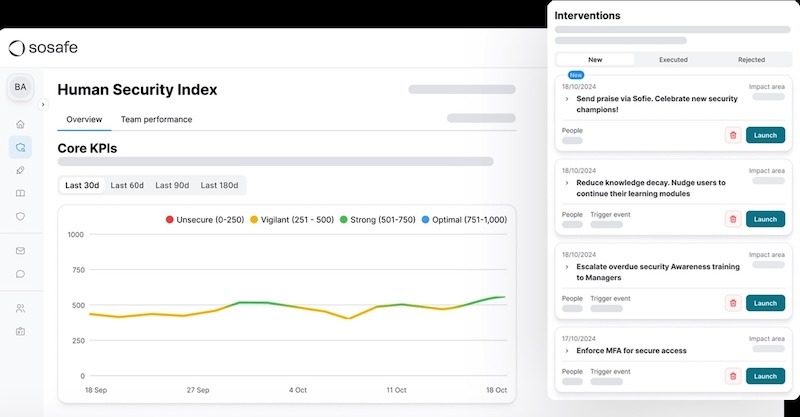
SoSafe focuses on behavioral data, which includes tracking how employees react to simulated attacks and then tailoring follow-up micro-lessons. It also provides in-depth reporting, compliance tracking, and integrations with enterprise systems like HR tools and Microsoft 365.
Pros of SoSafe:
- Strong phishing simulation engine with adaptive learning pathways
- Analytics-driven “human risk score” gives management measurable insights
- Customizable training modules that align with compliance standards (GDPR, ISO, etc.)
- Enterprise-grade reporting and integrations with existing IT/security infrastructure
- Available in multiple languages, making it suitable for global teams
Cons of SoSafe:
- More complex setup compared to lightweight SMB-focused platforms
- Potentially high costs, making it less attractive for very small businesses
- Requires ongoing admin effort to fine-tune simulations and reporting
8. InfoSec IQ
Infosec IQ is a security awareness training and phishing simulation platform from Infosec Institute, helping organizations reduce human risk through compliance-ready education. It offers a wide content library, realistic phishing templates, and analytics to measure employee behavior change.
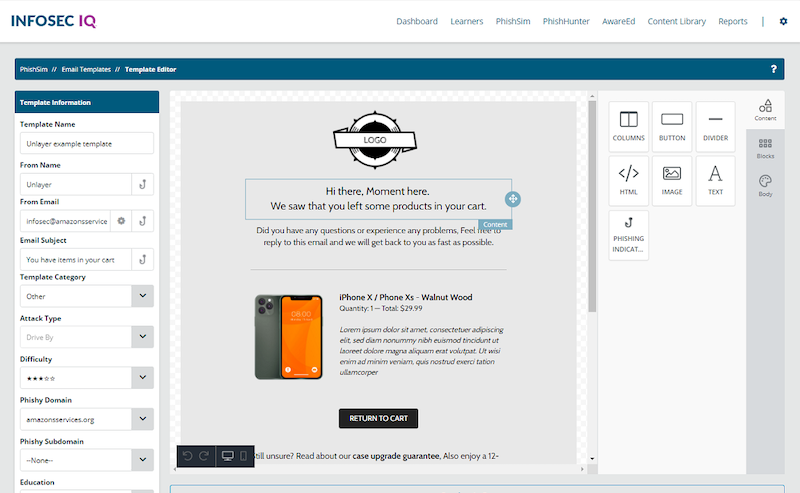
Infosec IQ focuses on role-based learning paths and integrates with compliance frameworks like HIPAA, PCI, and GDPR, making it suitable for regulated industries. Its phishing simulator includes customizable campaigns with automated follow-up training for employees who fail tests.
Pros of InfoSec IQ:
- Large, regularly updated content library covering compliance, role-specific, and security topics
- Phishing simulator with realistic, customizable templates and auto-enrollment in remedial training
- Strong compliance alignment (HIPAA, PCI, GDPR) and reporting features that auditors value
- Multi-language support for global rollouts
Cons of InfoSec IQ:
- Admin interface can feel complex for first-time users, and setup requires time.
- Its UI is less modern and intuitive compared to newer vendors.
- Reporting could be easier to customize across multiple teams or periods.
How to evaluate the right solution
Pick the wrong tool and training turns into a once-a-year slideshow where employees click “next” just to get the certificate. Two weeks later, someone in finance is still wiring money to a fake vendor email.
That’s training that merely checks a compliance box without mitigating the risk. The right platform should actually shift behavior, integrate with your stack, and provide CISOs with metrics they can present to the board like phishing click-through rates dropping quarter over quarter, faster employee reporting times, or reduced incident response costs.
Key evaluation criteria
Here are some key elements to consider when looking for the right security training software:
- Human risk reduction, not vanity metrics: Verizon’s DBIR found 68% of breaches involve the human element, like clicking a phishing link, reusing passwords, or misconfiguring cloud data. Don’t be impressed by “hours of content delivered” or whether employees “finished a module.”
You need to determine your phishing training program's ROI and see if risky behaviors actually decline, such as fewer clicks on phishing links, faster reporting when something looks suspicious, and better password hygiene.
- Preparedness for new-age scams: Recent industry research shows that AI-driven fraud now accounts for over 42% of attacks in the financial and payments sector. Static email templates don’t prepare employees for real threats. These include vishing calls that mimic executives, deepfake video interviews, and smishing that bypasses corporate email.
Luckily, modern training platforms have started adapting to this reality. Adaptive Security includes simulations for deepfake calls, smishing, and AI-written spear phishing campaigns, so employees can practice against these tactics before they appear in the wild.
- Compliance that doesn’t feel like detention: HIPAA, GDPR, and PCI compliance matters because if your employees mishandle data or miss a disclosure requirement, you’re looking at fines in the millions. But nobody learns from a monotone video with stock actors.
The best platforms weave compliance into engaging, scenario-based modules. This could be a nurse navigating a HIPAA patient data request or a finance clerk spotting a GDPR data export attempt.
- Integration into the tools you already use: Look for platforms where phishing test data, employee risk scores, and completion metrics flow into your SIEM, HRIS, or collaboration tools.
Enterprise vs. mid-market considerations
Enterprise
Global organizations need scale. That means:
- Localization and translation for distributed teams
- Enterprise-grade reporting that auditors and regulators trust
- Integrations into SIEMs, identity systems, and collaboration tools
Vendors like Proofpoint and KnowBe4 tend to dominate here because they’re built around compliance breadth and scale. The trade-off is that deployments can be lengthy, admin-heavy, and harder to adapt to new threat types quickly.
This is where Adaptive comes in. It keeps the essentials big companies need, including multilingual training (35-38+ languages), compliance-aligned reporting, SSO via your identity provider, and integration with your security logging and alerting tools, while fitting the stack you already use, so updates land faster without piling on admin work.
Mid-market
Smaller organizations don’t have the same compliance pressures, but they face a different challenge: limited time and staff. They need platforms that:
- Run almost on autopilot without a full-time security admin
- Deliver a relevant training solution quickly, without a steep learning curve, and without months of content development
- Automate cleanup (e.g., pulling phishing emails from inboxes) to reduce the team’s manual cleanup efforts
That’s why platforms that are light, simple, and don’t demand deep security expertise to run resonate here.
Adaptive Security: bridging the gap
Most platforms serve either the enterprise CISO or the IT-overstretched mid-market. Very few span both. Adaptive Security covers both ends.
A global enterprise can use it for multi-language training and audit-ready compliance metrics. In contrast, a mid-sized company can use the same system to quickly create a module just for its finance team (say, simulating an invoice scam) without hiring a training specialist.
That flexibility makes it useful whether you’re running a 20-person IT department or you’re the lone IT lead juggling everything from password resets to phishing defense.
Why do top brands choose Adaptive Security?
Most awareness platforms teach the basics. Adaptive was built for the reality of the modern world, one where deepfake calls, AI-written phishing, and SMS lures are now part of daily risk.
Top brands from every industry choose Adaptive Security to stay ahead of evolving cybersecurity attacks targeting their employees.
Outcome-driven case studies
Security leaders don’t care how many hours of video an employee watched. They care about reducing risky behaviors. Adaptive’s customers report clear improvements.
For example, Core Health & Fitness saw failure rates drop to just 5%, with employees rating training 4.7/5 and onboarding 10/10. At Nectar, Adaptive delivered a 10/10 onboarding experience and drove stronger engagement with tailored content.
These kinds of results translate into more employees reporting suspicious activity quickly and fewer costly incidents slipping through the cracks.
Built for AI Threats
Adaptive Security enables users to gain hands-on experience with emerging cyberattacks. The platform can create AI personas for deepfakes of anyone within an organization and instantly implement them into training and simulations.
With a focus not just on email phishing, Adaptive is one of the few platforms with built-in simulations and deepfake protection. This helps employees practice against voice clones, fake video calls, and AI-crafted spear phishing before they face them in the real world.
Modern UI & Adaptable
A Fortune 500 CISO has very different needs than a single IT manager at a 400-person firm. Adaptive works for both.
Enterprises rely on it for multi-language rollouts and audit-ready compliance dashboards. Smaller teams value the ability to spin up role-specific modules in hours—like, building a quick smishing drill for sales reps without needing a training department. Contracts are also flexible, with shorter terms and per-seat pricing that scales up or down as teams change.
Organizations aren’t safer because employees watched a training video on cyber threats; they’re safer when every individual user can recognize deepfake calls or phishing attempts before they cause damage. Adaptive Security is built for that.
Try Adaptive’s demo and decide if it’s the right fit for your team.
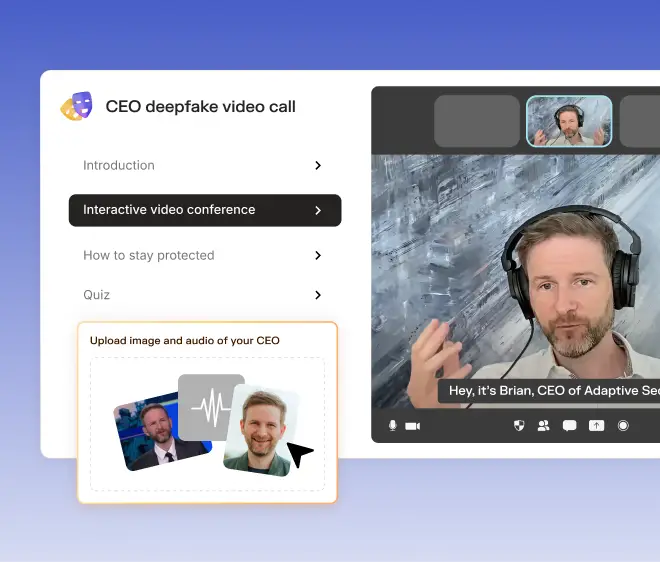



As an avid writer and startup enthusiast, Eitan became acutely aware of how bad actors might misuse AI to breach organizations and cause immense disruption.
Contents
